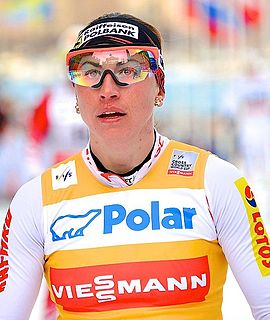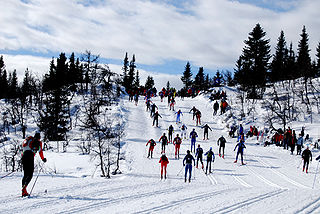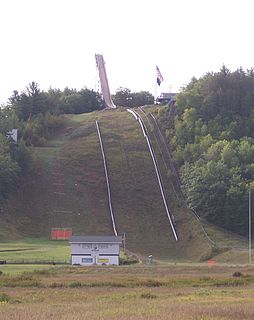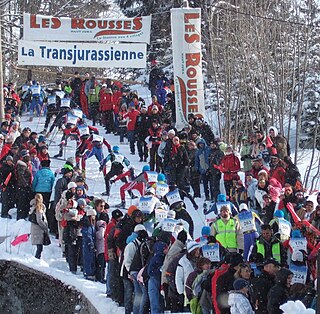
Skiing can be a means of transport, a recreational activity or a competitive winter sport in which the participant uses skis to glide on snow. Many types of competitive skiing events are recognized by the International Olympic Committee (IOC), and the International Ski Federation (FIS).

Nordic combined is a winter sport in which athletes compete in cross-country skiing and ski jumping. Nordic combined at the Winter Olympics and the FIS Nordic Combined World Cup are ongoing.

The FIS Nordic World Ski Championships is a biannial nordic skiing event organized by the International Ski Federation (FIS). The World Championships was started in 1925 for men and opened for women's participation in 1954. World Championship events include nordic skiing's three disciplines: cross-country skiing, ski jumping, and nordic combined. From 1924 to 1939, the World Championships were held every year, including the Winter Olympics. After World War II, the World Championships were held every four years from 1950 to 1982. Since 1985, the World Championships have been held in odd-numbered years.
Bente Skari, née Martinsen, is a Norwegian former cross country skier. She is one of the most successful cross country skiers ever.

The FIS Alpine World Ski Championships are an alpine skiing competition organized by the International Ski Federation (FIS).
Combined is an event in alpine ski racing. A traditional combined competition consists of one run of downhill and two runs of slalom, each discipline run on separate days. The winner is the skier with the fastest aggregate time. A modified version, the super combined, is a speed race and only one run of slalom, with both portions scheduled on the same day.

Justyna Maria Kowalczyk is a Polish cross country skier who has been competing since 2000. Kowalczyk is a double Olympic Champion and a double World Champion. She is also the only skier to win the Tour de Ski four times in a row and one of two female skiers, who won the FIS Cross-Country World Cup three times in a row. Kowalczyk holds the all-time record for the most wins in Tour de Ski with 14 competitions won and 29 podiums in total. She also won the Vasaloppet women's edition in 2015.

Birkebeinerrennet is a long-distance cross-country ski marathon held annually in Norway. It debuted in 1932 and has been a part of Worldloppet as long as Worldloppet has been around.
Cristina Paluselli is an Italian cross country skier who competed from 1993 to 2006.

The Tour de Ski (TdS) is a cross-country skiing event held annually since the 2006–07 season in Central Europe, modeled on the Tour de France of cycling. The Tour de Ski is a Stage World Cup event in the FIS Cross-Country World Cup. Each Tour de Ski has consisted of six to nine stages, held during late December and early January in the Czech Republic, Germany, Italy, and Switzerland. As of 2019, the prize money for the event amount to 560,000 Swiss francs, shared out on both men and women. Men's and ladies' events are held together on the same days, with the only difference being the distance skied.

The Pine Mountain Ski Jump is one of the highest artificially created ski jumps in the world, located in Iron Mountain, Michigan, Dickinson County. It is part of the Kiwanis Ski Club and hosts annual FIS Ski Jumping Continental Cup competitions. "Pine Mountain Slide is known throughout the world as one of the better jumping hills." Annually in February, it "hosts jumpers from around the world at the best tournament in the United States." Top-rated foreign jumpers compete. Currently Pine Mountain holds the U.S. records for the longest jump in World Cup competition at 140m, as well as the overall distance record at 143.5m. The facility also includes two smaller ski jumping hills that are built into the hill northwest of the large hill. Attendance is about 20,000.
The Fossavatn Ski Marathon is an annual ski marathon held in Ísafjörður, northwestern Iceland, and is part of Worldloppet since 2014.
Tornedalsloppet is an annual ski marathon held in Övertorneå, Sweden. Held since 1968, Tornedalsloppet is among the older long-distance ski-races in Sweden and the only one which commences in the Arctic Circle and finishes south of it. Traditionally two different races are held, one 45 km for adults aged 21–65 and one 23 km, for young adults aged 17–20. Since 2006 the race had formally been one of the four locations of the FIS Nordic Ski Marathon Cup, a series which includes the Tornedalsloppet, the Holmenkollen Skimaraton in Norway, the Fossavatn Ski Marathon in Iceland and Oulun Tervahiihto in Finland. The race is now usually the third race of the cup, held in late March or early April.

The Transjurassienne is an annual cross-country ski race held on the second Weekend of February between Lamoura and Mouthe in the French Jura mountains. It debuted in 1980 and has been a part of Worldloppet since 1981. It is also part of the FIS Marathon Cup and the biggest cross-country skiing event in France. More than 4,000 skiers participate over the two days each year. Saturday is devoted to classic-style with races taking place over 25 km and 50 km. The main race takes place on Sunday - the 76 km long Tranjurassienne in skating-style - the longest skating race on the Worldloppet tour. Shorter races over 57 km and 25 km are also offered. Participation is open to anyone from the age of 16, and while no licence is required to sign up, the organisers demand a medical certificate to demonstrate the ability to take part in a long-distance skiing event.

The sport of cross-country skiing encompasses a variety of formats for cross-country skiing races over courses of varying lengths according to rules sanctioned by the International Ski Federation and by various national organizations, such as the U.S. Ski and Snowboard Association (USSA) and Cross Country Ski Canada. International competitions include the FIS Nordic World Ski Championships, the FIS Cross-Country World Cup, and at the Winter Olympic Games. Such races occur over homologated, groomed courses designed to support classic (in-track) and freestyle events, where the skiers may employ skate skiing. It also encompasses cross-country ski marathon events, sanctioned by the Worldloppet Ski Federation, and cross-country ski orienteering events, sanctioned by the International Orienteering Federation. Related forms of competition are biathlon, where competitors race on cross-country skis and stop to shoot at targets with rifles, and paralympic cross-country skiing that allows athletes with disabilities to compete at cross-country skiing with adaptive equipment.
The FIS Race is the oldest series of ski jumping competitions arranged yearly by the International Ski Federation. It is considered the fourth level of international ski jumping, ranking below the World Cup, Continental Cup and FIS Cup. Most of the events are held on normal hills and large hills, with a construction point of 90 meters. All top level and other international events before the World Cup was founded were part of FIS (race) competitions.
The Nordic Opening is a cross-country skiing event held annually since the 2010–11 season in Ruka, Finland or Lillehammer, Norway. The Nordic Opening is a Stage World Cup event in the FIS Cross-Country World Cup, and are held as the first or second World Cup race weekend of the season. The inaugural Nordic Opening was held in 2010 and was originally named Ruka Triple. The editions of the mini-tour hosted in Lillehammer is also known as Lillehammer Triple. Each Nordic Opening consists of three stages; a sprint, an individual race and a pursuit. As of 2018, the prize money for the event amount to 240,000 Swiss francs, shared out on both men and women. Men's and ladies' events are held together on the same days, with the only difference being the distance skied.
The FIS Cross-Country World Cup Finals is a cross-country skiing event held annually since the 2007–08 season in various places in Europe or Canada. The World Cup Finals is a Stage World Cup event in the FIS Cross-Country World Cup, and are held as the last World Cup race weekend of the season. The inaguaral World Cup Finals was held in 2008 in Bormio, Italy. As of the 2018–19 season, the World Cup Finals consists of three stages; a sprint, a mass start race and a pursuit.











